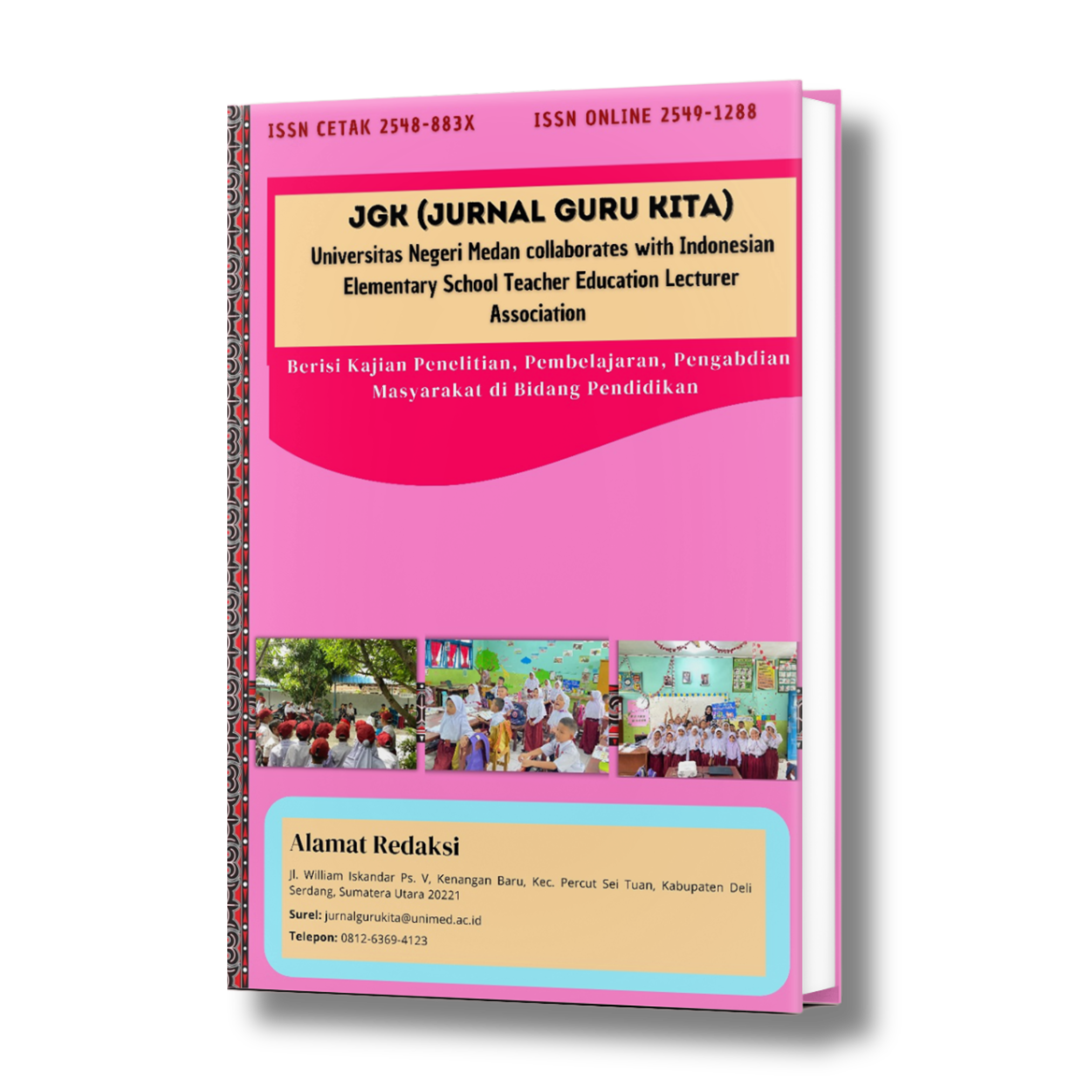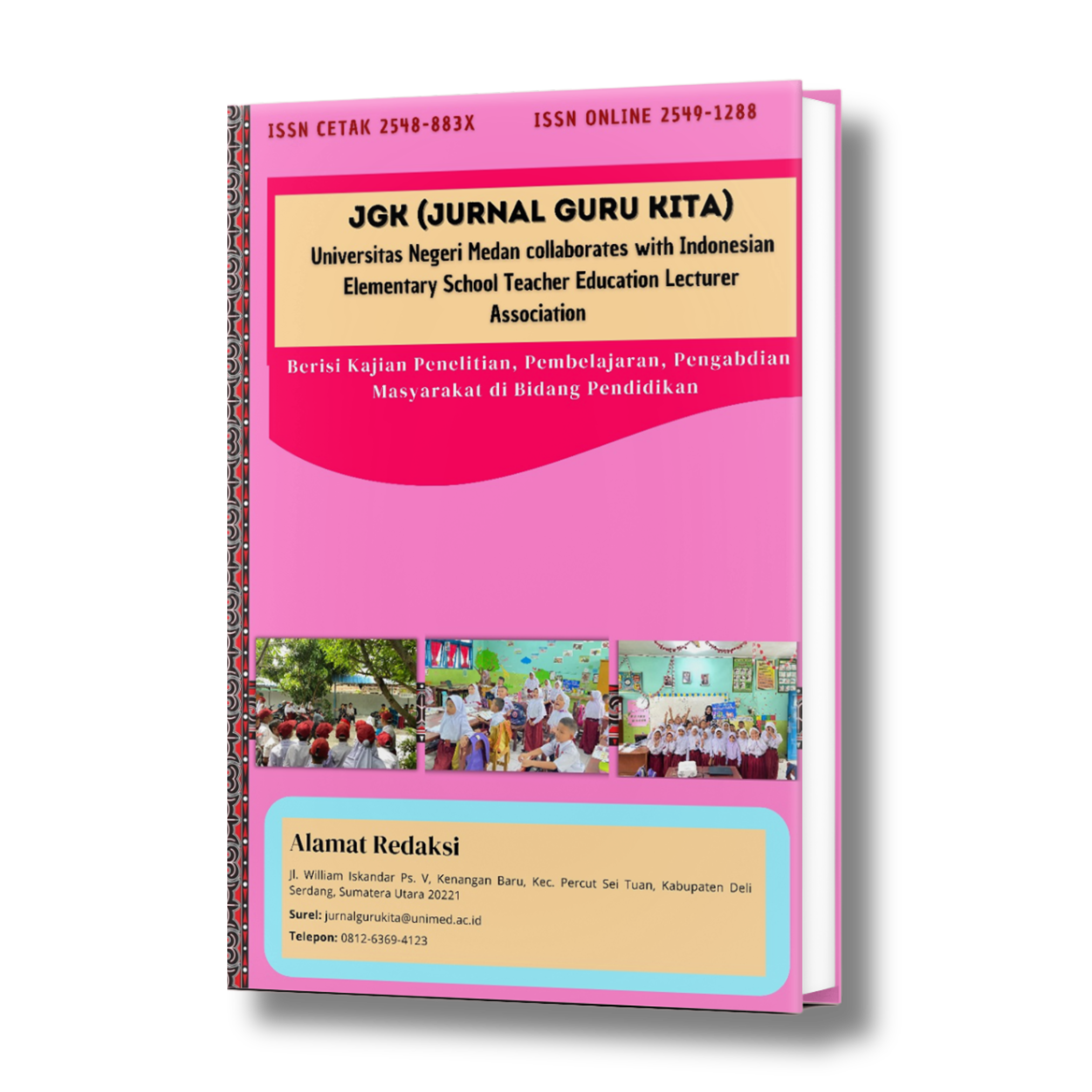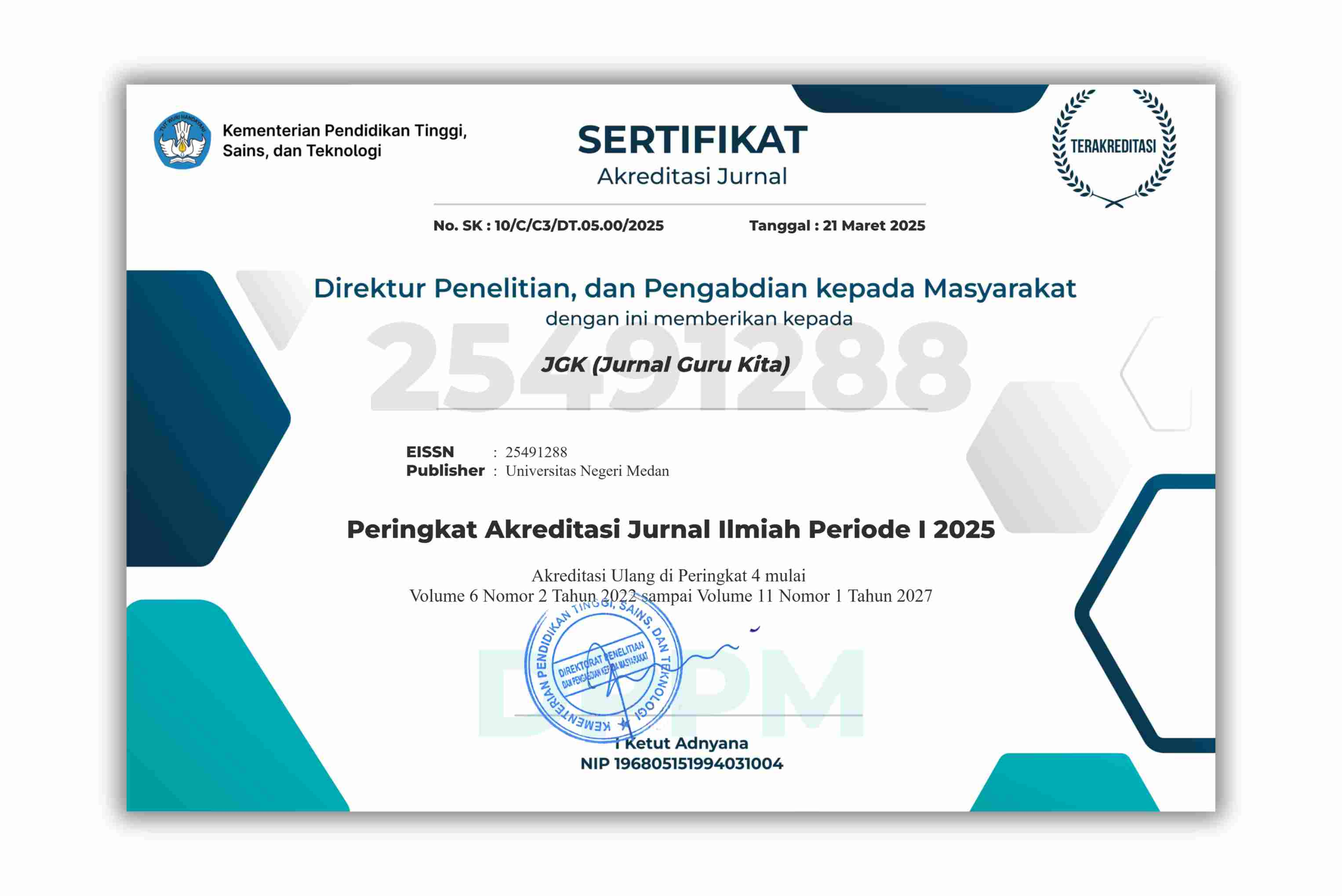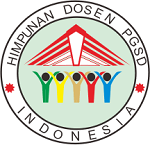Implementasi Pendidikan Inklusi di Sekolah Dasar Negeri Ciracas Daerah Jakarta Timur
DOI:
https://doi.org/10.24114/jgk.v9i3.64505Keywords:
Inklusif, Anak, Disabilitas, Sekolah DasarAbstract
Penelitian ini ditujukan untuk menganalisa karakteristik peserta didik di SDN Ciracas. Pendidikan inklusi mulai diterapkan di kurikulum Merdeka saat ini dikarenakan kita harus menyelaraskan anak berkebutuhan khusus dengan anak normal. Namun, ada beberapa anak yang mendiskriminasi anak berkebutuhan khusus sehingga anak tersebut menjadi kurang minat untuk menuntut Pendidikan. Sehingga guru harus berpikir kreatif untuk menyelaraskan kedua anak dalam satu kelas. Penelitian ini menggunakan pendekatan kualitatif metode deskriptif dengan Teknik samping jenis purposive sampling. Subjek pada penelitian ini yaitu kepala sekolah dan objek pada penelitian ini yaitu siswa berkebutuhan khusus di kelas1-6 di SDN Ciracas. Terdapat 16 peserta didik yang berkebutuhan khusus di sekolah tersebut. Walaupun pihak sekolah belum dapat menyediakan fasilitas untuk anak berkebutuhan khusus di sekolah, mereka tetap melayani anak- anak tersebut dengan baik dan memberikan pelayanan yang khusus. Para guru sudah mulai menjalani pelatihan khusus Pendidikan inklusi. Sehingga anak berkebutuhan yang ada di sekolah tersebut dapat melakukan pembelajaran dengan aman dan nyaman.References
Akimov, N., Kurmanov, N., Uskelenova, A., Aidargaliyeva, N., Mukhiyayeva, D., Rakhimova, S., Raimbekov, B., & Utegenova, Z. (2023). Components of education 4.0 in open innovation competence frameworks: Systematic review. Journal of Open Innovation: Technology, Market, and Complexity, 9(2), 100037. https://doi.org/10.1016/j.joitmc.2023.100037
Bartolo, P. A., Kyriazopoulou, M., Björck-Åkesson, E., & Giné, C. (2021). An adapted ecosystem model for inclusive early childhood education: a qualitative cross European study. International Journal of School & Educational Psychology, 9(1), 3–15. https://doi.org/10.1080/21683603.2019.1637311
Bazen, A., Barg, F. K., & Takeshita, J. (2021). Research Techniques Made Simple: An Introduction to Qualitative Research. Journal of Investigative Dermatology, 141(2), 241-247.e1. https://doi.org/10.1016/j.jid.2020.11.029
Creswell, J. W., & Creswell, J. D. (2017). Research design: Qualitative, quantitative, and mixed methods approaches. Sage publications.
Dalgaard, N. T., Bondebjerg, A., Viinholt, B. C. A., & Filges, T. (2022). The effects of inclusion on academic achievement, socioemotional development and wellbeing of children with special educational needs. Campbell Systematic Reviews, 18(4). https://doi.org/10.1002/cl2.1291
Darling-Hammond, L., Schachner, A. C. W., Wojcikiewicz, S. K., & Flook, L. (2024). Educating teachers to enact the science of learning and development. Applied Developmental Science, 28(1), 1–21. https://doi.org/10.1080/10888691.2022.2130506
El-Sabagh, H. A. (2021). Adaptive e-learning environment based on learning styles and its impact on development students’ engagement. International Journal of Educational Technology in Higher Education, 18(1), 53. https://doi.org/10.1186/s41239-021-00289-4
Hamel, C., Michaud, A., Thuku, M., Skidmore, B., Stevens, A., Nussbaumer-Streit, B., & Garritty, C. (2021). Defining Rapid Reviews: a systematic scoping review and thematic analysis of definitions and defining characteristics of rapid reviews. Journal of Clinical Epidemiology, 129, 74–85. https://doi.org/10.1016/j.jclinepi.2020.09.041
Haslita, R., Samin, R., Kurnianingsih, F., Okparizan, O., Subiyakto, R., Elyta, R., Anggraini, R., Muhazinar, M., & Ardiansya, A. (2021). Implementasi Kebijakan pada Kesetaraan Gender dalam Bidang Pendidikan. Takzim : Jurnal Pengabdian Masyarakat, 1(1), 81–86. https://doi.org/10.31629/takzimjpm.v1i1.3845
Kawar, L. N., Dunbar, G. B., Aquino-Maneja, E. M., Flores, S. L., Squier, V. R., & Failla, K. R. (2024). Quantitative, Qualitative, Mixed Methods, and Triangulation Research Simplified. The Journal of Continuing Education in Nursing, 55(7), 338–344. https://doi.org/10.3928/00220124-20240328-03
Kenny, N., McCoy, S., & O’Higgins Norman, J. (2023). A Whole Education Approach to Inclusive Education: An Integrated Model to Guide Planning, Policy, and Provision. Education Sciences, 13(9), 959. https://doi.org/10.3390/educsci13090959
Kurth, J. A., Lockman Turner, E., Gerasimova, D., Hicks, T. A., Zagona, A., Lansey, K., Mansouri, M. C., Lyon, K. J., Jameson, M., Loyless, R., & Pace, J. R. (2022). An Investigation of IEP Quality Associated With Special Education Placement for Students With Complex Support Needs. Research and Practice for Persons with Severe Disabilities, 47(4), 244–260. https://doi.org/10.1177/15407969221134923
Ligua, H., Arif, M., & Suong, M. A. A. (2024). Efektivitas Pelaksanaan Undang-Undang Nomor 39 Tahun 1999 Tentang Hak Asasi Manusia Terhadap Hak Memperoleh Keadilan. Journal of Lex Theory (JLT), 5(1), 337–358.
Maclean, L., & Law, J. M. (2022). Supporting primary school students’ mental health needs: Teachers’ perceptions of roles, barriers, and abilities. Psychology in the Schools, 59(11), 2359–2377. https://doi.org/10.1002/pits.22648
Markey, D. K., O’ Brien, D. B., Kouta, D. C., Okantey, C., & O’ Donnell, D. C. (2021). Embracing classroom cultural diversity: Innovations for nurturing inclusive intercultural learning and culturally responsive teaching. Teaching and Learning in Nursing, 16(3), 258–262. https://doi.org/10.1016/j.teln.2021.01.008
Maryanti, R., Hufad, A., Sunardi, S., Nandiyanto, A. B. D., & Kurniawan, T. (2021). Analysis of Curriculum for Science Education for Students with Special Needs in Vocational High Schools. Journal of Technical Education and Training, 13(3). https://doi.org/10.30880/jtet.2021.13.03.006
Miles, M. B., Huberman, A. M., & Saldaña, J. (2014). Qualitative data analysis: A methods sourcebook. 3rd. Thousand Oaks, CA: Sage.
Munastiwi, E., & Puryono, S. (2021). Unprepared management decreases education performance in kindergartens during Covid-19 pandemic. Heliyon, 7(5), e07138. https://doi.org/10.1016/j.heliyon.2021.e07138
Nilholm, C. (2021). Research about inclusive education in 2020 – How can we improve our theories in order to change practice? European Journal of Special Needs Education, 36(3), 358–370. https://doi.org/10.1080/08856257.2020.1754547
Nurhayatun, A., Juhanaini, & Susetyo, B. (2021). The Competence of Early Childhood Education Service Teachers in Providing Education Services to Children with Special Needs. https://doi.org/10.2991/assehr.k.210413.075
Oliveira, G., Grenha Teixeira, J., Torres, A., & Morais, C. (2021). An exploratory study on the emergency remote education experience of higher education students and teachers during the COVID‐19 pandemic. British Journal of Educational Technology, 52(4), 1357–1376. https://doi.org/10.1111/bjet.13112
Pertiwi, A. D., Nurfatimah, S. A., & Hasna, S. (2022). Menerapkan Metode Pembelajaran Berorientasi Student Centered Menuju Masa Transisi Kurikulum Merdeka. Jurnal Pendidikan Tambusai, 6(2), 8839–8848. https://jptam.org/index.php/jptam/article/view/3780
Ringgi Rahmat Fitra, Rochmat Wahab, & Hana Andriningrum. (2023). Implementation of The Education Curriculum For ABK. Jurnal Ilmiah Sekolah Dasar, 7(1), 96–103. https://doi.org/10.23887/jisd.v7i1.54968
Satiadharmanto, D. F. (2023). a KRIMINALISASI ANAK BERKEBUTUHAN KHUSUS DAN KELUARGA OLEH EMPIRISME PIHAK KETIGA DI BUKITTINGGI. AL WASATH Jurnal Ilmu Hukum, 3(2), 113–126. https://doi.org/10.47776/alwasath.v3i2.544
Schmid, E., & Garrels, V. (2021). Parental involvement and educational success among vulnerable students in vocational education and training. Educational Research, 63(4), 456–473. https://doi.org/10.1080/00131881.2021.1988672
Shutaleva, A., Martyushev, N., Nikonova, Z., Savchenko, I., Kukartsev, V., Tynchenko, V., & Tynchenko, Y. (2023). Sustainability of Inclusive Education in Schools and Higher Education: Teachers and Students with Special Educational Needs. Sustainability, 15(4), 3011. https://doi.org/10.3390/su15043011
Stamenkov, G. (2023). Recommendations for improving research quality: relationships among constructs, verbs in hypotheses, theoretical perspectives, and triangulation. Quality & Quantity, 57(3), 2923–2946. https://doi.org/10.1007/s11135-022-01461-2
Sugiyono, S. (2019). Metode Penelitian Pendidikan (Kuantitatif, Kualitatif, Kombinasi, R&D dan Penelitian Pendidikan). CV. Alfabeta.
Sugiyono, S. (2022). Metode Penelitian Kuantitatif, Kualitatif Dan R&D. Alfabeta.
Szumski, G., Smogorzewska, J., & Grygiel, P. (2022). Academic achievement of students without special educational needs and disabilities in inclusive education–Does the type of inclusion matter? PLOS ONE, 17(7), e0270124. https://doi.org/10.1371/journal.pone.0270124
Togher, L., Douglas, J., Turkstra, L. S., Welch-West, P., Janzen, S., Harnett, A., Kennedy, M., Kua, A., Patsakos, E., Ponsford, J., Teasell, R., Bayley, M. T., & Wiseman-Hakes, C. (2023). INCOG 2.0 Guidelines for Cognitive Rehabilitation Following Traumatic Brain Injury, Part IV: Cognitive-Communication and Social Cognition Disorders. Journal of Head Trauma Rehabilitation, 38(1), 65–82. https://doi.org/10.1097/HTR.0000000000000835
Walton, E., & Engelbrecht, P. (2024). Inclusive education in South Africa: path dependencies and emergences. International Journal of Inclusive Education, 28(10), 2138–2156. https://doi.org/10.1080/13603116.2022.2061608
Zhan, Z., He, W., Yi, X., & Ma, S. (2022). Effect of Unplugged Programming Teaching Aids on Children’s Computational Thinking and Classroom Interaction: with Respect to Piaget’s Four Stages Theory. Journal of Educational Computing Research, 60(5), 1277–1300. https://doi.org/10.1177/07356331211057143
Zhang, F., Li, S., Zhao, Q., & Huo, Z. (2025). Assessing and prioritizing interactive teaching modes based on student satisfaction in higher education: A case study of a freshmen class. Education and Information Technologies, 30(5), 6511–6545. https://doi.org/10.1007/s10639-024-13073-4
Downloads
Published
How to Cite
Issue
Section
License
Copyright (c) 2025 Najla Delfina Andarawan, Vivi Oktaviani, Zulfadewina Zulfadewina

This work is licensed under a Creative Commons Attribution-ShareAlike 4.0 International License.
Authors published with the JGK (Jurnal Guru Kita) agree to the following terms:
- Authors retain copyright and grant the journal the right of first publication with the work simultaneously licensed under a Creative Commons Attribution License (CC BY-SA 4.0) that allows others to share the work with an acknowledgment of the work's authorship and initial publication in this journal.
- Authors are able to enter into separate, additional contractual arrangements for the non-exclusive distribution of the journal's published version of the work (e.g., post it to an institutional repository or publish it in a book), with an acknowledgment of its initial publication in this journal.
- Authors are permitted and encouraged to post their work online (e.g., in institutional repositories or on their website) prior to and during the submission process, as it can lead to productive exchanges, as well as earlier and greater citation of published work. (See The Effect of Open Access)

























